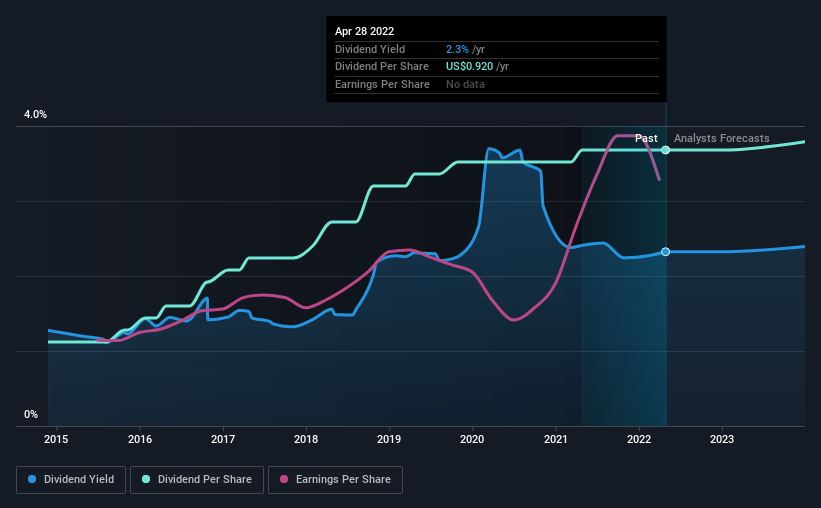Home Bancorp, Inc. (NASDAQ:HBCP) has announced that it will pay a dividend of US$0.23 per share on the 20th of May. The dividend yield is 2.3% based on this payment, which is a little bit low compared to the other companies in the industry.
Check out our latest analysis for Home Bancorp
Home Bancorp's Dividend Is Well Covered By Earnings
While yield is important, another factor to consider about a company's dividend is whether the current payout levels are feasible. However, prior to this announcement, Home Bancorp's dividend was comfortably covered by both cash flow and earnings. As a result, a large proportion of what it earned was being reinvested back into the business.
Over the next year, EPS is forecast to fall by 20.6%. If the dividend continues along recent trends, we estimate the payout ratio could be 28%, which we consider to be quite comfortable, with most of the company's earnings left over to grow the business in the future.

Home Bancorp Is Still Building Its Track Record
It is great to see that Home Bancorp has been paying a stable dividend for a number of years now, however we want to be a bit cautious about whether this will remain true through a full economic cycle. Since 2015, the first annual payment was US$0.28, compared to the most recent full-year payment of US$0.92. This works out to be a compound annual growth rate (CAGR) of approximately 19% a year over that time. We're not overly excited about the relatively short history of dividend payments, however the dividend is growing at a nice rate and we might take a closer look.
The Dividend Looks Likely To Grow
Investors who have held shares in the company for the past few years will be happy with the dividend income they have received. Home Bancorp has seen EPS rising for the last five years, at 14% per annum. Growth in EPS bodes well for the dividend, as does the low payout ratio that the company is currently reporting.
We Really Like Home Bancorp's Dividend
Overall, we like to see the dividend staying consistent, and we think Home Bancorp might even raise payments in the future. The company is generating plenty of cash, and the earnings also quite easily cover the distributions. We should point out that the earnings are expected to fall over the next 12 months, which won't be a problem if this doesn't become a trend, but could cause some turbulence in the next year. Taking this all into consideration, this looks like it could be a good dividend opportunity.
Market movements attest to how highly valued a consistent dividend policy is compared to one which is more unpredictable. Still, investors need to consider a host of other factors, apart from dividend payments, when analysing a company. For example, we've picked out 1 warning sign for Home Bancorp that investors should know about before committing capital to this stock. Looking for more high-yielding dividend ideas? Try our collection of strong dividend payers.
Valuation is complex, but we're here to simplify it.
Discover if Home Bancorp might be undervalued or overvalued with our detailed analysis, featuring fair value estimates, potential risks, dividends, insider trades, and its financial condition.
Access Free AnalysisHave feedback on this article? Concerned about the content? Get in touch with us directly. Alternatively, email editorial-team (at) simplywallst.com.
This article by Simply Wall St is general in nature. We provide commentary based on historical data and analyst forecasts only using an unbiased methodology and our articles are not intended to be financial advice. It does not constitute a recommendation to buy or sell any stock, and does not take account of your objectives, or your financial situation. We aim to bring you long-term focused analysis driven by fundamental data. Note that our analysis may not factor in the latest price-sensitive company announcements or qualitative material. Simply Wall St has no position in any stocks mentioned.
About NasdaqGS:HBCP
Home Bancorp
Operates as the bank holding company for Home Bank, National Association that provides various banking products and services in Louisiana, Mississippi, and Texas.
Flawless balance sheet with solid track record and pays a dividend.
Market Insights
Community Narratives




